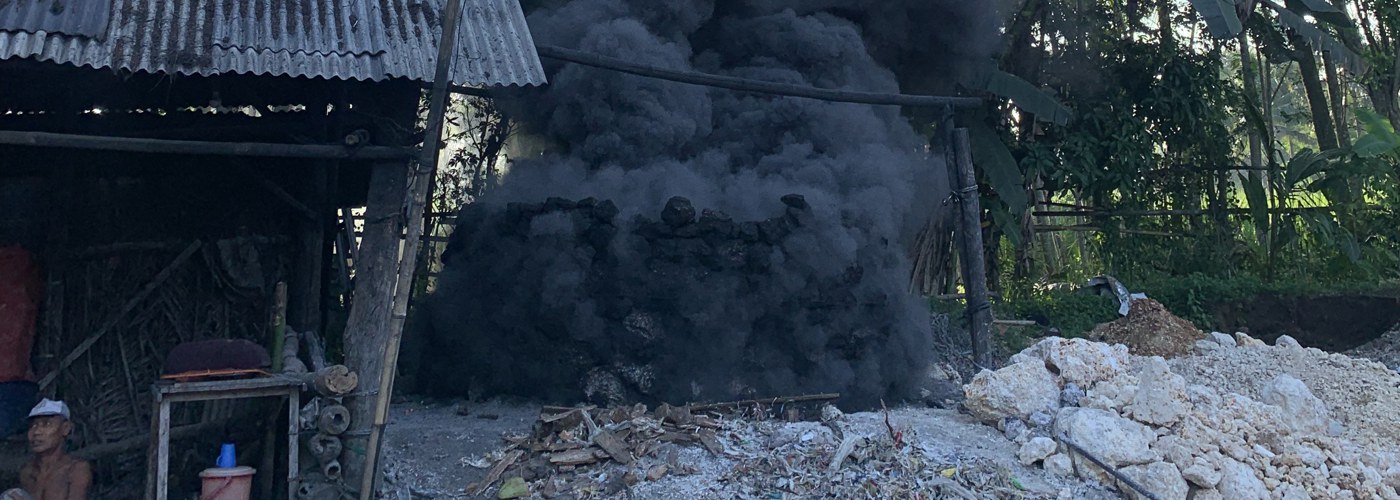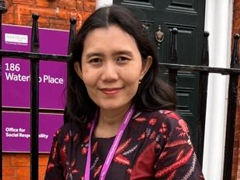Investigating the cardiovascular impact of plastic pollution in Indonesia
Air pollution caused by burning plastic waste is an escalating public health issue, particularly in rural parts of Indonesia where waste management is limited. A new study led by Dr Asri Maharani at The University of Manchester and funded by the British Heart Foundation is investigating how this form of pollution contributes to cardiovascular disease risk among affected populations.

In East Java, mountains of imported plastic waste, often mixed in with paper recycling, arrive daily in small villages like Sumberejo. For many families, sorting this waste has become the main way to earn a living.
Each village receives around 50 tonnes of low-quality plastic every day. The plastic piles up in front of people’s homes, where women often aged over 40 work as informal ‘plastic farmers’. They separate the paper, which can be resold to factories, but are left with large amounts of unrecyclable plastic. With nowhere to send it, the community burns it as fuel.
Homes and small-scale industries use this plastic waste to power limestone kilns and tofu factories. These fires often burn for days at a time, producing thick, toxic smoke that fills the air. But in these rural areas, there are no official air quality monitors and no clear information on what this is doing to people’s health.
Understanding the risks of rural air pollution
Working in collaboration with Universitas Brawijaya, Indonesia, Dr Maharani’s study is looking at the harmful pollution caused when plastic waste is burned. In the communities being studied, the level of pollution in the air is incredibly high - over 800 micrograms per cubic metre, compared to the World Health Organization’s recommended safe level of just 12.

Dr Asri Maharani
Asri is a lecturer in the Division of Nursing, Midwifery and Social Work. She has experience as a practising physician, hospital manager and educator in public health in Indonesia.
These microscopic particles are small enough to enter the lungs and bloodstream, increasing the risk of serious health conditions including heart disease, stroke, and respiratory illness.
“Unlike pollution from traffic or urban industries, this is a unique form of rural air pollution,” Dr Maharani notes. “We’re looking at how it contributes to chronic conditions, particularly cardiovascular disease, which is under-researched in this setting.”
Generating evidence for change
The research team is placing air quality sensors in villages with high and low levels of exposure, to compare conditions. They are also collecting air samples to analyse in the UK, identifying what kinds of chemicals and particles people are breathing in, including microplastics and dioxins, which are known to harm health.
At the same time, they are working with local health teams to collect health data from residents. Blood pressure, blood sugar, BMI and inflammation markers will all be measured, alongside blood tests to check for signs of cardiovascular risk. Around 260 people will take part in the screening, with data gathered from both high-exposure and low-exposure villages.
By comparing these two groups, the study aims to understand the link between air pollution from burning waste and the high rates of heart disease in the area.
“Plastic pollution is everywhere,” Dr Maharani says. “But in rural areas with no waste services, people are left to burn it themselves. We need to understand how that affects their health - not just to document it, but to change it,” Dr Maharani notes.
Global insights from local data
Although the project is based in Indonesia, its findings could have wide-reaching implications. Imported plastic waste often comes from high-income countries like the UK, yet the people most affected by it are those with the fewest resources to protect themselves.
The research is also exploring how lessons from this work can be used in the UK, where air pollution is still a major health issue. Understanding the connection between specific pollutants and cardiovascular disease could lead to new interventions, better prevention strategies, and stronger environmental health policies.
Policy and healthcare impact
One of the study’s key goals is to feed its findings into health and environmental policy. The team is working directly with Indonesian health authorities, and all data collected will support the country’s new national screening programme, which provides health checks on citizens’ birthdays.
Ultimately, the project aims to improve both waste regulation and primary healthcare in rural communities. By exposing the hidden dangers of burning plastic waste, Dr Asri Maharani’s work is helping to protect the health of vulnerable populations by giving a voice to those living on the frontline of a global environmental crisis.
With special thanks to our other investigators
Learn more about our global health activities and our work in heart and circulatory research.
